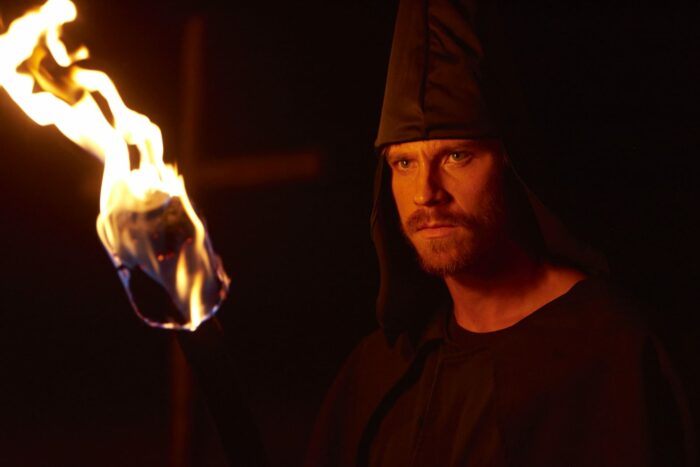It is very relevant and very opportune how the true-to-life main character’s last name fittingly became a perfect title for this kind of movie. Call it telling. Call it fate even. One could also call it a warning. Burden is as dramatic and uncomfortable as the many layers of the namesake word itself. The winner of the U.S. Dramatic Audience Award at the 2018 Sundance Film Festival finally makes its theatrical bow nearly two years after its praised debut.
The Merriam-Webster Dictionary logs five disseminations for “burden.” They include “something oppressive or worrisome,” “a duty or responsibility,” “something that is carried,” “the bearing of a load,” and finally “the capacity for carrying cargo.” All five are arduous in their own way, and all five occupy the heft of Andrew Heckler’s directorial debut from 101 Studios. Let’s swerve within and weave the upheaval of it altogether.
The setting defines the oppression and worry present. This is Laurens, South Carolina in 1996 where a faction of the white townsfolk have rehabbed the Echo Theater. What is introduced to possibly be honest construction work reveals its true intimidating purpose when the drape drops across the marque and the Confederate colors unfurl to reveal the theater transformed into the Redneck KKK Museum. The local wizard with the ring everyone kisses in town is Tom Griffin (Academy Award nominee Tom Wilkinson). His Plantation Concrete and Repossession front orchestrates property, poverty, and people in this community with indignant spits and scowls in public and torch-bearing hoods to terrorize at night.
Where the KKK burn crosses, a different fire is lit across town. That flame is one of faith belonging to Baptist church leader David Kennedy, played by Oscar-winner Forest Whitaker. Reverend Kennedy typifies the weight of duty and responsibility. Despite the suffocating hate seething from the racial opponents, David is committed to his desired path of nonviolence for his parishioners and his own wife Janice (Crystal Fox of Big Little Lies) and angry teen son Kelvin (Dexter Darden of The Maze Runner series). He, his followers, and even a visiting Jesse Jackson protest the new racist landmark.
Love versus fear is the paramount ideal of Rev. Kennedy’s messages, whether it’s on a pulpit or shouted into a megaphone. He cites Jesus’s perfect love as the most honest and surefire way of rebuking evil. That progress is slow and difficult and he may be outnumbered and outgunned in Laurens.

The ingrained hate enforced by Griffin runs deep for one of his dragons and our title focus Mike Burden. Played with snarled speech and even more gnarled twitch by Garrett Hedlund in an extraordinary and immersive performance, Mike Burden may be lockstep with the KKK, but he slowly shows his capacity for humanity underneath. This comes out in his courtship of the tough cookie Judy (Mandy’s Andrea Riseborough) and her unprejudiced son. However, the weight of manly expectations on Mike and years of conditioned behavior as a former orphan brought up within those monstrous attitudes is hard to shake. He epitomizes the “something that is carried” notion from earlier.
Mike’s softening through Judy has him finally leave the KKK, much to the irritation of Griffin and his former brothers-in-robes. Unemployed, evicted, and expelled from jobs for his attitude and reputation, he and Judy live out of a car and panhandle for money. Living his mission even when seen as impossible, Rev. Kennedy takes Mike and Judy in for roof and a meal.
Rev. Kennedy is inviting a violent man into his home who once had him in a sniper’s crosshairs. That same man though is disowned and dealing with repercussions and ramifications of his present situation and his past actions. In a way, Rev. Kennedy now takes on that “capacity” level of “burden” as well as the danger that comes with it. It’s very ominous how the most lines of “be careful” come from Tom Griffin and his very real, yet veiled threats.
“Love thy enemy,” says Rev. Kennedy. The proverbial “capacity for carrying cargo” is really the capacity for charity. How many of even the holiest people can accept and take on the challenge David has championed? To many, it’s an unfathomable position. Rev. Kennedy, through a stalwart showing from Forest Whitaker (one would expect nothing less from the veteran that so often exudes empathy from his pores), is a man willing to put his faith in men equal to his faith in God.
The path before Mike and Rev. Kennedy is removing the title word hindrance and all its trappings. This story evolves from documenting tension to one of spiritual awakening. For the historical characters, that requires admitting wrongs, repenting, and learning to mind themselves with love instead of its negative opposites. The film’s epilogue shows the archival television interviews with Burden and Kennedy, and they really seal the potential impact of this viewing experience.
That said, this is not an easy walkabout or spiritual amputation. It is not subtle, but neither is hard personal change like that found in this story. Burden is ugly and maddening even with dramatization. You may not like it, but the effort is there to respect.
The issues come from imbalance. For every all-in Method nuance from Hedlund or constant commendable grace from Whitaker, there are other actors (like Wilkinson, Riseborough, Austin Hebert, and Usher Raymond) filling in the checkboxes of regional/racial stereotypes with little depth. There’s a smidge of “if you’ve seen one raging redneck stereotype, you’ve seen them all.”
Those imbalances spill into the production as well. Sounds of tone-signaling church bells and chorus of piped-in southern country sounds are broken by the electric guitar chords of composer Dickon Hinchliffe for an up-and-down aural experience. Cinematographer and short film specialist Jeremy Rouse is all over the place with an in-your-face shaky-cam style that tries to eventually steady at the same pace as the lead character calms, but the jiggle is overly-used and jarring.
The final disproportion comes from the strength of this story. The bite is there, so to speak, but not soothed enough. If the proper swell and inspiration of the Mike Burden story is his recovery and rebirth, Heckler’s movie takes far too long to get to that peak. If the useful emphasis is the healing and not the hurt and the tenets on “burden” listed above, that’s what the experience emphasis should favor.



